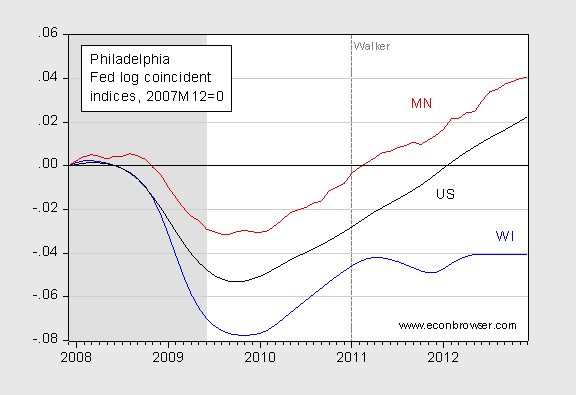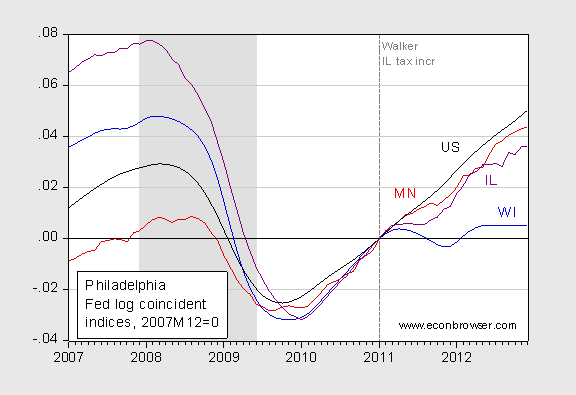There has been something of a dispute between Governor Walker and Governor Dayton of Minnesota. From Minnesota Public Radio, Governor Walker’s tweet, in response to Governor Dayton’s speech:
“In ’11, IL raised taxes on income by 66% & businesses by 46%. Now MN Gov is proposing a $2 bil tax increase. WI is Open for Business.”
We can examine the relative performance of Minnesota and Wisconsin under the differing taxation and spending regimes by reference to the Philadelphia Fed’s coincident indices.

Figure 1: Log coincident indices for WI (blue), MN (red) and US (black), normalized to 2007M12=0. NBER defined recession dates shaded gray. Source: Philadelphia Fed, NBER, and author’s calculations.
One of these is not like the others.
Update, 9am 1/26: Reader Derek notes that the proper point of comparison is against IL, and normalized to tax increases in IL and Walker’s inauguration. CoRev asserts that the interpretation would change if one made this comparison. Here is the resulting graph.

Figure 2: Log coincident indices for WI (blue), MN (red), IL (purple), and US (black), normalized to 2011M01=0. NBER defined recession dates shaded gray. Source: Philadelphia Fed, NBER, and author’s calculations.
I will let readers decide if their conclusions change.
Update, noon, 1/27: From TwinCities.com “Wisconsin: Former Scott Walker aide sentenced to 2 years”:
MILWAUKEE — A former top aide to Wisconsin Gov. Scott Walker was sentenced Tuesday to two years in prison after he was convicted of stealing more than $20,000 from a nonprofit group Walker appointed him to lead.
Timothy D. Russell, 49, pleaded guilty in November to felony theft, a charge that carries a maximum penalty of five years in prison. First-time offenders are often sentenced to probation, but Judge David Hansher said he gave prison time because Russell’s contrition was insincere.
“There is absolutely no true regret, remorse or repentance,” the judge said. “I find that you don’t even have any shame.”
Russell was one of six people charged in a secret investigation of the Milwaukee County executive’s office back when Walker held that office between 2002 and 2010. Russell and four others have been convicted, and a trial for the sixth begins next week.
Walker, a Republican, has not been charged with wrongdoing and has repeatedly said he is not a target in the investigation. The probe began in May 2010, six months before Walker was elected governor.
As Walker’s deputy chief of staff, Russell was the third most powerful person in Milwaukee County behind Walker and Chief of Staff Tom Nardelli. The criminal complaint alleges that Russell used his position and influence to gain financial control of the Heritage Guard Preservation Society, a nonprofit group that organizes outings for veterans to the Milwaukee County Zoo.
I’m actually looking forward to some of the tax changes proposed by GOP run states. Let them try the magic potion and see if it works as the ideology says it must.
Menzie, thanks for continuing these. Trying to keep Walker accountable for his dismal performance is like trying to hold a slippery fish. I heard the other day he was trying to change the way unemployment is measured in Wisconsin to somehow make his failure into success. (ref: http://www.leadertelegram.com/news/daily_updates/article_7c292fba-64d2-11e2-8f90-001a4bcf887a.html) Walker has been an absolute failure.
Not that your premise is necessarily wrong, but your graph doesn’t come anywhere near showing the smoking gun you seem to be implying. Two points come to mind…
First of all, Walker was implying that MN was about to do something damaging like IL did in 2011. This makes MN irrelevant for the purposes of the comparison graph. What is pertinent is the results in IL, not MN and the graph doesn’t show what happened in IL.
Second, anything that happened prior to the tax increase in IL first being considered is totally irrelevant. The point used for normalization should be much later than Dec-2007. It should be no earlier than when the tax increase was first considered because that is the absolute earliest point at which the impending tax increase could possibly have begun to impact economic decisions and thus economic results. An easier point to choose for normalization would be the date that the IL tax increases became effective.
Speaking as an exec in a software company, there are many reasons to relocate or choose a new location. But there are lots of factors. I’d say the over-riding one is the talent pool. Sure, all things being equal taxes etc might come up, but most of the time (if you’re not doing completely skilled production) it’s access to talent. And that presupposes “places where smart, talented people want to live. That would mean, most likely, Progressive State policies or a location in one of the more urban areas with access to lots of college grads. I might suggest that “controversial political figures” is also not a bonus because stability is another very high consideration. So your chart above tells me two things: businesses don’t see the State as “a place with a deep talent pool” and “the political climate is too risky and/or controversial”. So Walker’s policies might be influential in a strict manufacturing “let’s get the cost down” sort of way, but in other venues not so much. Hence the flattening of the curve. But I’d love to see a study done of selection of expansion by industry and State policies on taxation.
Derek gets it.
SPRINGFIELD (WIFR) — Illinois’ unemployment rate dropped by 0.2 to 10.1 percent for the month of August. This marks the eighth month in a row of steady declining unemployment rates.
Wisconsin’s unemployment rate stayed the same at 7.9 percent, the national unemployment rate is 9.6 percent. http://www.wifr.com/news/headlines/103103814.html
Derek and CoRev: See the added graph.
Adding IL adds more evidence that Walker’s employment policies have created a flat line. Just saying you are open for business and throwing some select tax breaks to organizations/companies that support you politically does not create jobs. As econimonium mentions locating a business has a lot more to do with talent pool, community services, and other progressive policies. Gee whiz, you could have guessed it?
WI is the 5th highest tax state, and is one of the lowest in state tax income from out of state, so it stands to reason that they are struggling to get back to a reasonable level.
Minnesota ranks as one of the best-performing states in the nation by several measures. The state has the second-highest rate in the country — 92% — of adults with a high school diploma, while just 8.8% of the population lacks health insurance, the fourth-lowest figure in the U.S. Minnesota also has one of the nation’s lowest poverty rates, as well as the eighth-lowest crime rate in the U.S. at 221.2 violent crimes per 100,000 residents. On the other hand, Minnesota had one of the highest state and local tax burdens in the nation, at 10.8% of income in fiscal 2010. Democrats recently won control of the state legislature, and are expected to attempt to reform the state’s tax structure and possibly increase taxes on the wealthy
Perhaps no state budget has generated as much controversy in recent years as Wisconsin’s. In early 2011, Governor Scott Walker proposed a budget repair bill, requiring state employees to contribute 50% of their annual pension payment, while eliminating the collective bargaining rights of most state workers. Prior to its passage, Wisconsin faced multi-billion dollar budget deficits, including a $3.5 billion shortfall in fiscal 2011, or 24.9% of the state’s budget — one of the larger deficits in the country in that year. These deficits occurred every year, despite one of the nation’s highest income tax burdens of 11.1%. In fiscal 2010, the state had the nation’s only fully funded pension program, although all contributions were paid for by the state.
Although many states have budget issues, Illinois’ faces among the biggest problems. In 2010, the state’s budget shortfall was more than 40% of its general fund, the second-highest of any state. Both S&P and Moody’s gave Illinois credit ratings that were the second-worst of all states. In addition, the state only funded 45% of its pension liability in 2010, the lowest percentage of any state. Governor Patrick Quinn has made the now-$85 billion pension gap a top priority for the new legislative session beginning in January.
Read more: The Best and Worst Run States in America: A Survey of All 50 – 24/7 Wall St. http://247wallst.com/2012/11/27/the-best-and-worst-run-states-in-america-a-survey-of-all-50/#ixzz2J6suMlnr
@Keating that’s all well as good, but as I said, when we’re deciding where to expand or relocate a business, no one, and let me repeat it, no one at the executive level says “gee, I wonder who runs their State really well?”. When we moved my company’s headquarters to Boston, not once did taxes, how well the government was run, or politics come up. But we sure talked a lot about access to talent, lifestyle, education, amenities, and culture given our business. We also talked about cost of living all things being relative, but sometimes that’s a price for the other items.
So if you’re looking to boost the State’s economy, you just have to make it attractive to people like our company. Governor Walker isn’t creating the type of environment where people like we need will be. Therefore, no matter how well he might “run” the State, the question you really need to ask yourself is, what is the priority here? If the priority is to have first class educational institutions that turn out talented people, and those talented people don’t mind hanging around after graduation, then you thrive. If you’re slashing education (or teaching creationism), in the news for constantly fighting, have Bachmann as your elected Representative, voting against women’s or gay rights issues, or some other nonsense, having a balanced budget doesn’t really matter. You might get a manufacturing plant here and there because that’s a very by-the-numbers activity, but how many people are employed that way any more? This isn’t the 50’s. And we don’t base a business on ideology. We base it on EBITA.
Obviously, there are a lot more variables that go into business decisions than the tax rate as econimonium testified to. However, WI is clearly NOT performing as well as IL, MN, or the US in general.
A few interesting things I see in the new graph…
Conclusions, IMHO…
Wow! That doesn’t look at all like it did in the preview.
Derek: Formatting fixed.
Menzie didn’t even bring up the most damning stat in comparing WI and MN. The BLS says Minnesota gained 52,000 jobs in the last 12 months, while Wisconsin only gained 9,100, and now Minnesota has more total jobs than Wisconsin, despite having 384,000 fewer people in the 2010 Census. I wrote about this contrast in results in further detail when Walker opened up his mouth last week.
As noted by other posters above, quality of life is a huge factor when it comes to attracting the talent that companies want, and Minnesota has a whole lot more to offer to thinking employers than Wisconsin due to progressive, pro-education policies and the turning back of a gay marriage ban this Fall. These things do matter when it comes to making the smart folks want to locate in your state- for both employee and employer – and they mean a whole lot more than tax giveaways to corporations.
Sorry, that was me in the previous post.